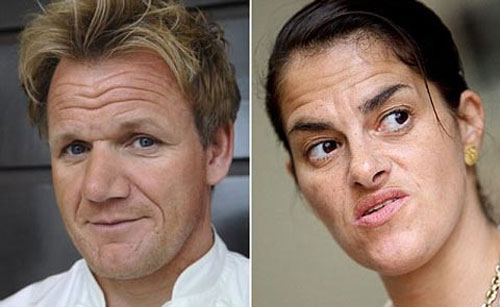The face revealed about childhood
According to a new study, what a person has experienced actually marks his / her face.
In some people, dewy skin and deep wrinkles on the face reveal clear evidence of the hard life they have experienced. However, British scientists have recently discovered that we can know people's childhood through their facial features.
The Telegraph newspaper reported, through examining 15 different facial features including eye, nose, mouth and ear positions, scientists from the University of Edinburgh (UK) discovered, those with Asymmetric faces tend to go through an unstable childhood and are nurtured in a more difficult situation than those who possess symmetrical faces.

A noticeable imbalance on the face of chef Gordon Ramsay and painter Tracey Emin shows that they have gone through extreme childhood. (Photo: Getty Images)
The above findings show that what goes on early in life, such as nutritional conditions, illnesses, exposure to pollution and other aspects of difficult living conditions, has left a distinctive mark on the mold. human face. Surprisingly, these facial features are not affected by the later socioeconomic status in their lives. In other words, even those who have found a way to go from poverty to riches never get out of the past because it will be printed on their faces.
The results of the study may explain why some celebrities such as the famous Scotalnd chef Gordon Ramsay or painter Tracey Emin, who grew up in poverty and destitution, possessed characteristics. symmetrical easy to recognize on the face even though it is the owner of the wealthy assets
The link between facial symmetry and hard work can explain why many studies have found that people with symmetrical faces are considered to be the most attractive. Certain facial features can unconsciously reveal that a person who is difficult to be chosen as a partner due to extreme childhood can make them more vulnerable to illness and premature death.
In their study, British scientists found that facial symmetry could be used along with medical signs such as high blood pressure to identify people at high risk. However, Professor Ian Deary, a member of the research team, admitted there are still many issues to clarify before making this possible.
- The reason why we forget to celebrate our childhood
- Decipher the mystery of forgetting childhood memories
- The restored face of the Queen of Egypt is controversial
- Difficult childhood will increase the risk of short-term life
- Early childhood injury affects sperm quality
- The picture of innocent and clear childhood
- People with unlucky childhood possess 4 advantages compared to ordinary people
- Returning to childhood with a set of photos
- Should children go to kindergarten early?
- People with a peaceful childhood easily divorce
- The difference between a young buffalo and an adult
- The secret to watch the face read the personality in just 1 minute
 'Fine laughs' - Scary and painful torture in ancient times
'Fine laughs' - Scary and painful torture in ancient times The sequence of numbers 142857 of the Egyptian pyramids is known as the strangest number in the world - Why?
The sequence of numbers 142857 of the Egyptian pyramids is known as the strangest number in the world - Why? History of the iron
History of the iron What is alum?
What is alum?